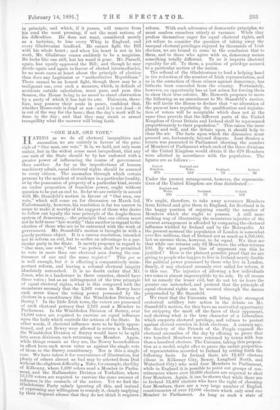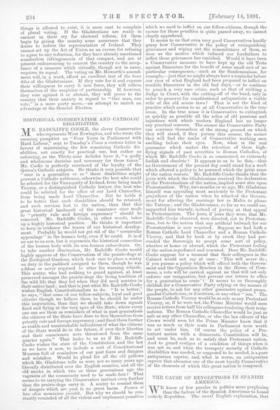" ONE MAN, ONE VOTE." H ATING as we do all
electoral inequalities and anomalies, we are entirely in favour of the prin- ciple of " One man, one vote." It is, we hold, not only most unfair, but in the widest sense most inexpedient, that any one unit of the State should be by law endowed with a greater power of influencing the course of government than another. As far as the imperfections of human machinery admit, equal electoral rights should be assured to every citizen. The anomalies through which certain persons by the accident of residence in a particular locality, or by the possession of property of a. particular kind, secure an undue proportion of franchise power, ought without question to be put an end to. So far we are entirely in accord with Mr. Stansfeld's motion in favour of " One man, one vote," which will come on for discussion on March 3rd. Unfortunately, however, his resolution is far too narrow in scope to make it worthy of the support of those who desire to follow out loyally the true principle of the Anglo-Saxon system of democracy,—the principle that one citizen must not be held more " law-worthy " than another in regard to the election of those who are to be entrusted with the work of government. Mr. Stansfeld's motion is brought in with a purely partisan object. It is a caucus resolution, intended not to reform an evil, but to sectre an advantage to a par- ticular party in the State. It merely proposes in regard to " One man, one vote," that " no person shall be permitted to vote in more than one electoral area during the con- tinuance of one and the same register." This per se is well enough, but it is effecting a comparatively unim- portant reform, and leaving a colossal electoral iniquity absolutely untouched. It is no doubt unfair that Mr. Jones, who is a landowner in three counties, should have three votes ; but as an infringement of the true principle of equal electoral rights, what is this compared with the monstrous anomaly that the 2,168 voters in Newry have each seven times the voting power possessed by the electors in a constituency like the Wimbledon Division of Surrey ? In the little Irish town, the voters are possessed of such electoral potency that 2,163 send a Member to Parliament. In the Wimbledon Division of Surrey, over 14,000 votes are required to exercise an equal influence upon the body which controls the actions of the State. In other words, if electoral influence were to be fairly appor- tioned, and yet Newry were allowed to return a Member, the Wimbledon Division of Surrey would have to be split into seven divisions, each returning one Member. Again, while things remain as they are, the Newry householders in effect have each seven votes as against the single vote of those in the Surrey constituency. Nor is this a single case. We have taken it for convenience of illustration, but plenty of others almost as bad may be selected from Dod without the slightest difficulty., Take, for example, the City of Kilkenny, where 1,899 voters send a Member to Parlia, ment, and the Hallamshire Division of Yorkshire, where 13,176 voters are required to exercise the same amount of influence in the counsels. of the nation. Yet we find the Gladstonian Party calmly ignoring all this, and instead of expressing any willingness to remedy it, clearly implying by their eloquent silence that they do not think it requires reform. With such advocates of democratic principles, we must confess ourselves utterly at variance. While they profess themselves eager for equal electoral rights, and yet refuse to consider the question of taking away the unequal electoral privileges enjoyed by thousands of Irish electors, we are bound to come to the conclusion that to them, and to those who agree with us, democracy means something totally different. To us it imports electoral equality for all. To them, a position of privilege secured to a particular section of the nation. The refusal of the Gladstonians to lend a helping hand in the reduction of the number of Irish representation, and so in the correction of these crimes against democracy, has hitherto been concealed from the country. Fortunately, however, an opportunity has at last arisen for forcing them to show their true colours. Mr. Howorth proposes to move the following as an amendment to Mr. Stansfeld's motion. He will invite the House to declare that " no alteration of the present laws regulating the qualification and registra- tion of voters will be acceptable which does not at the same time provide that the different parts of the United Kingdom of Great Britain and Ireland shall be represented proportionately to their population." This raises the issue plainly and well, and the debate upon it should help to clear the air. The facts upon which the discussion must proceed are, fortunately, beyond dispute. Last Session a return was presented to Parliament showing the number of Members of Parliament which each of the three divisions of the United Kingdom would obtain if the 670 Members were allotted in accordance with the population. The figures are as follows :—
United Kingdom
870
Under the present arrangement, however, the representa- tives of the United Kingdom are thus distributed :— England and
Wales. Scotland. Ireland.
495 72 103
We ought, therefore, to take away seventeen Members from Ireland and give them to England, for Scotland is in the happy position of enjoying exactly the number of Members which she ought to possess. A still more striking way of illustrating the monstrous injustice of the present arrangement is afforded by comparing the electoral influence wielded by Ireland and by the Metropolis. At the present moment the population of London is somewhat over five millions, that of Ireland not as much as 4,700,000. Let us assume them, however, to be equal. We then see that while one returns only 62 Members, the other returns 103. By what possible line of argument can this be justified ? Here is the plainest possible proof that we are giving to people who happen to live in Ireland nearly double the political power possessed by those who live in London. Surely, if any electoral anomaly ever called for reform, it is this one. The injustice of allowing a few individuals two votes is almost imperceptible by its side. By all means let us remedy the lesser evil, but do not let us leave the greater one untouched, and pretend that the principle of equal electoral rights can bo secured through the means propounded by Mr. Stansfeld. We trust that the Unionists will bring their strongest oratorical artillery into action in the debate on Mr. Stansfeld's motion, for they have an unrivalled opportunity for stripping the mask off the faces of their opponents, and showing what is the true character of a Liberalism which supports electoral privilege, and refuses to protest against clerical coercion in Irish elections. A century ago, the Society of the Friends of the People exposed the electoral anomalies of the day by offering to prove that two hundred Members were returned by towns with less than a hundred electors. The Unionist, taking this proposi- tion as a model, might offer to prove the unfair proportion of representation accorded to Ireland by setting forth the following facts. In Ireland there are 12,483 electors (those in Kilkenny City, Newry, Longford North, and Waterford City) who send four Members to Parliament, while in England it is possible to point out groups of con- stituencies where over 50,000 electors are required to elect four Members. Again, it can be shown that while there are in Ireland 12,483 electors who have the right of choosing four Members, there are a very large number of English constituencies of over 12,000 electors which only send one Member to Parliament. As long as such a state of
England and Wales. Scotland. Ireland,
512 72 86
things is allowed to exist, it is mere cant to complain of plural voting. If the Gladstonians are really in earnest in their cry for electoral reform, let them begin by giving the country some assurance that they desire to reduce the representation of Ireland. They cannot set up the Act of Union as an excuse for refusing to agree to any reduction, for they have already sanctioned numberless infringements of that compact, and are at present endeavouring to convert the country to the accep- tance of a measure which virtually, though not in name, requires its repeal. The voting on Mr. Howorth's amend- ment will, in a word, afford an excellent test of the bona fides of the Gladstonians. If they vote for it and express their willingness to carry it into force, they will relieve themselves of the suspicion of partisanship. If, however, they vote against it or abstain, they will prove to the country that their anxiety in regard to " One man, one vote," is a mere party move,—an attempt to snatch an advantage at the General Election.



































 Previous page
Previous page